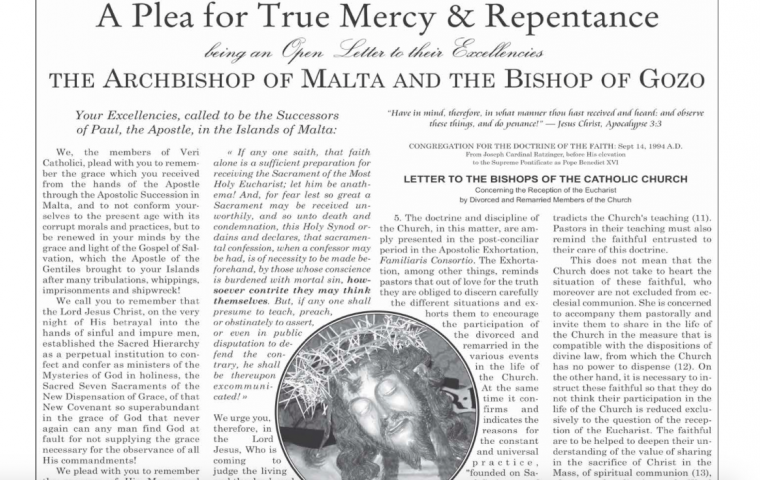Catholics In Malta Condemn 'Abominable' Document On Marriage And Divorce

Catholic Christians in Malta have taken their bishops to task with a full-page newspaper advertisement calling on them to be true to the "doctrine and discipline" of the Catholic Church.
The Catholic faithful, from a conservative organisation Veri Catholici, have spoken out after their bishops appeared to sanction granting the sacraments of Confession and Holy Communion to divorced and remarried Catholics.
In their latest pastoral document, the Maltese bishops state that if, as a result of the process of discernment, "a separated or divorced person who is living in a new relationship manages, with an informed and enlightened conscience, to acknowledge and believe that he or she are at peace with God, he or she cannot be precluded from participating in the sacraments of Reconciliation and the Eucharist".
The bishops' document was issued as a response to the Pope's own exhortation, Amoris Laetitia, published after his two synods on the family, which has been widely criticised by conservatives in the Church for softening the traditional line on divorce and remarriage.
The advertisement in The Times of Malta came as the same paper also reported widespread confusion among priests about whether or when to allow divorced and remarried Catholics to receive Holy Communion.
The advertisement was headlined: A Plea for True Mercy and Repentance.
It describes the bishops' document as "abominable" : "You have permitted the Most Holy Body and Blood of Our Lord and Master to be crucified and tortured once again in the mouths and hearts of filthy, impenitent adulterers and fornicators!"
It adds: "For those who do such things shall not, as the Apostle teaches, enter into the Kingdom of God."
The advertisement insists: "Members of the faithful who live together as husband and wife with persons other than their legitimate spouses may not receive Holy Communion."
Conservative commentator Chris Gillibrand told Christian Today: "Not for the first time in history, the laity are more Catholic than their pastors. At the time of the Arian heresy, not even the Pope but only St Athanasius of Alexandria remained faithful. As Cardinal Newman pointed out, 'The Catholic people, in the length and breadth of Christendom, were the obstinate champions of Catholic truth, and the bishops were not.'"











